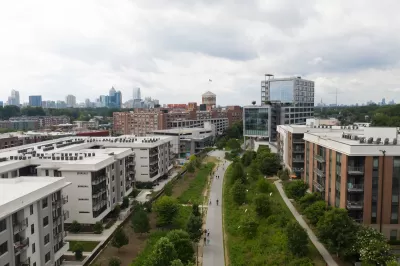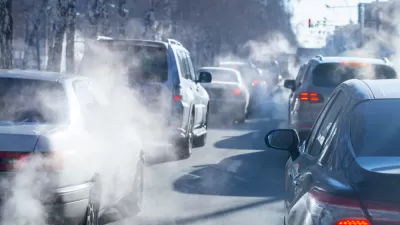The state is diversifying its energy sources to reduce carbon emissions by 50% by 2030, in line with federal climate goals.

The state of Georgia is making progress on its emissions reduction goals, "putting it closer to a new White House target of a 50% reduction in the U.S. by 2030 from 2005 levels," reports Matt Kempner for The Atlanta Journal-Constitution. The reductions are a result of "changes by not only big companies, developers and power producers but also individual metro Atlantans, many of whom have already partially reduced their carbon footprint, perhaps without fully realizing it." With an impressive 28% reduction in emissions between 2005 and 2018, "[f]ederal figures show that only five states have made larger percentage cuts than Georgia in carbon emissions from fossil fuel combustion."
The state's electric utility, Georgia Power, along with utilities across the country, has switched to natural gas for lower emissions. "Another carbon-free power source on the rise: solar power, with big gains in technology and far lower prices." The state is also poised to complete a nuclear power generation project.
"But there’s a lot more carbon to squeeze out, including in the electricity system, Georgia’s second-largest source of carbon belching, behind only transportation, according to the latest figures from the U.S. Environmental Protection Agency." Whereas in the past Georgia Power "has resisted federal mandates for change by power companies," Southern Company, Georgia Power's parent company, now "wants government policies that promote investments in research, development and deployment of new energy technologies, long-lasting batteries, new nuclear power options, energy efficiency and more favorable taxes." To promote cleaner energy, says Georgia's Sierra Club chair Daniel Blackman, "state elected officials need to reenact a canceled tax credit for electric vehicle purchases, boost construction of charging stations and push Georgia Power to close plants sooner."
FULL STORY: How Georgians might reach new U.S. target for 50% carbon cut

Maui's Vacation Rental Debate Turns Ugly
Verbal attacks, misinformation campaigns and fistfights plague a high-stakes debate to convert thousands of vacation rentals into long-term housing.

Planetizen Federal Action Tracker
A weekly monitor of how Trump’s orders and actions are impacting planners and planning in America.

In Urban Planning, AI Prompting Could be the New Design Thinking
Creativity has long been key to great urban design. What if we see AI as our new creative partner?

King County Supportive Housing Program Offers Hope for Unhoused Residents
The county is taking a ‘Housing First’ approach that prioritizes getting people into housing, then offering wraparound supportive services.

Researchers Use AI to Get Clearer Picture of US Housing
Analysts are using artificial intelligence to supercharge their research by allowing them to comb through data faster. Though these AI tools can be error prone, they save time and housing researchers are optimistic about the future.

Making Shared Micromobility More Inclusive
Cities and shared mobility system operators can do more to include people with disabilities in planning and operations, per a new report.
Urban Design for Planners 1: Software Tools
This six-course series explores essential urban design concepts using open source software and equips planners with the tools they need to participate fully in the urban design process.
Planning for Universal Design
Learn the tools for implementing Universal Design in planning regulations.
planning NEXT
Appalachian Highlands Housing Partners
Mpact (founded as Rail~Volution)
City of Camden Redevelopment Agency
City of Astoria
City of Portland
City of Laramie





























